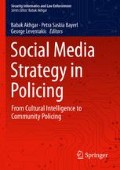Abstract
Community policing (CP) lacks a precise definition and research findings point at a basis dilemma: the service aspect of policing vs. the crime-fighting attitudes of a masculinity-oriented cop culture. Social media engagement by police can provide significant advantages to improve police–community interactions. As a steadily spreading and encompassing form of communication and interaction, however, social media can also have unintended repercussions for police and society. The description and analysis of such repercussions are the main objective of this chapter. Among the issues are tendencies to support vigilante attitudes as well as the stimulation of unwarranted fears of crime. This chapter investigates these aspects in an explorative and descriptive manner before it closes with suggestions for a meaningful use of police CP apps in the area of domestic violence, a dramatically under-policed category of conflict with low reporting rates and high patterns of victimization.
Access this chapter
Tax calculation will be finalised at checkout
Purchases are for personal use only
Notes
References
Being There. (1971). Motion Picture directed by Hal Ashby with Peter Sellers. Shirley MacLaine and Jack Warden. Retrieved from https://en.wikipedia.org/wiki/Being_There
Brainard, L., & Edlins, M. (2014). Top 10 US municipal police departments and their social media usage. American Review of Public Administration, 61, 1–18.
Chappell, A. T. (2009). The philosophical versus actual adoption of community policing—A case study. Criminal Justice Review, 34(1), 5–28.
Corsianos, M. (2012). The complexities of police corruption-gender, identity, and misconduct. Lanham, MD: Rowman & Littelfield.
DPZ. (2017). Polizei und die Sozialen Medien. Die Polizei Zeitschrift Baden-Württemberg, 1, 6–14.
Elias, N. and Scotson, J. L. (1994). The Established and the Outsiders: A Sociological Enquiry into Community Problems. London: Sage.
Gauss, K. M. (2017). Echtzeit. Süddeutsche Zeitung Nr. 59, (11.712. März), p. 5.
Keane, N. J. (2016). Police use of social media to support community engagement—Its rise in police practice in the UK. European Police Science and Research Bulletin. Special Conference Edition, 101–105.
Lee, J. V. (2010). Policing after 9/11: Community policing in an age of homeland security. Police Quarterly, 13, 347–362.
Manning, P. K. (2010). Democratic policing in a changing world. Boulder: Paradigm Publishers.
Sheptycki, J., & Bowling, B. (2016). Global policing and the constabulary ethic. European Police Science and Research Bulletin. Special Conference Edition, 9–23.
Skogan, W. G. (2006). Police and community in Chicago: A tale of three cities (p. 344). Oxford: Oxford University Press.
Strittmatter, K. (2018). Augen auf – Chinas KP erfüllt sich den Traum aller autoritären Herrscher: die totale Überwachung und Kontrolle des Volkes. Süddeutsche Zeitung, 27, 3.
Süddeutsche Zeitung Magazin. (2017). Stopp. Bitte Lesen – Ein Heft über die Polizei. Nr. 31, 4. August.
The Guardian. (2017). Growing social media backlash among young people, survey shows. Retrieved from https://www.theguardian.com/media/2017/oct/05/growing-social-media-backlash-among-young-people-survey-shows.
Tönnies, F. (1887). Gemeinschaft und Gesellschaft. Grundbegriffe der reinen Soziologie. Berlin. Available online: http://www.deutschestextarchiv.de/book/show/toennies_gemeinschaft_1887
Turner, F. W., & Fox, B. H. (2017). Public servants or police soldiers? An analysis of opinions on the militarization of policing from police executives, law enforcement, and members of the 114th congress U.S. house of representatives. Police Practice and Research.
Author information
Authors and Affiliations
Editor information
Editors and Affiliations
Rights and permissions
Copyright information
© 2019 Springer Nature Switzerland AG
About this chapter
Cite this chapter
Kersten, J., Leonardmaier, N., Kreissl, R. (2019). Brave New Apps: An Essay on Community Policing and Social Media. In: Akhgar, B., Bayerl, P.S., Leventakis, G. (eds) Social Media Strategy in Policing. Security Informatics and Law Enforcement. Springer, Cham. https://doi.org/10.1007/978-3-030-22002-0_2
Download citation
DOI: https://doi.org/10.1007/978-3-030-22002-0_2
Published:
Publisher Name: Springer, Cham
Print ISBN: 978-3-030-22001-3
Online ISBN: 978-3-030-22002-0
eBook Packages: Literature, Cultural and Media StudiesLiterature, Cultural and Media Studies (R0)

